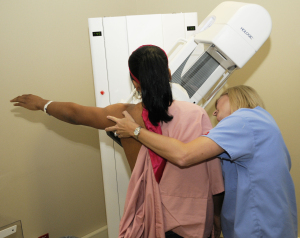New research has found that applying physical force on one’s breasts can prevent malignant cancer cells.
Researchers at the University of California Berkeley and the Lawrence Berkeley National Laboratory presented their findings Monday at the Society for Cell Biology in San Francisco.
“People have known for centuries that physical force can influence our bodies,” research team member Gautham Venugopalan said in a statement. “When we lift weights, our muscles get bigger. The force of gravity is essential to keeping our bones strong. Here we show that physical force can play a role in the growth — and reversion — of cancer cells.”
Squeezing breasts can help guide cells back into a normal growth pattern, stopping the “out-of-control” growth of malignant cancer cells.
“We are showing that tissue organization is sensitive to mechanical inputs from the environment at the beginning stages of growth and development,” principal investigator Daniel Fletcher, professor of bioengineering at Berkeley and faculty scientist at the Berkeley Lab, said in a statement. “An early signal, in the form of compression, appears to get these malignant cells back on the right track.”
To conduct the study, researchers grew malignant breast epithelial cells that were injected into silicone chambers. Once injected inside the flexible chambers, researchers began to apply physical force in the first stages of cell development.
Researchers noticed that the malignant cells that were compressed became healthier and more organized compared to the cells that were not. The compressed malignant cells stopped growing when the new breast tissue structure was formed, even after physical force was stopped.
“Malignant cells have not completely forgotten how to be healthy; they just need the right cues to guide them back into a healthy growth pattern,” Venugopalan said.
Despite the findings, researchers warn that this won’t cure breast cancer.
“Compression, in and of itself, is not likely to be a therapy,” Fletcher said. “But this does give us new clues to track down the molecules and structures that could eventually be targeted for therapies.”
The Centers for Disease Control and Prevention says breast cancer is the most common cancer among women in the U.S. Over 40,000 women died from breast cancer in 2008.

No Comments Yet